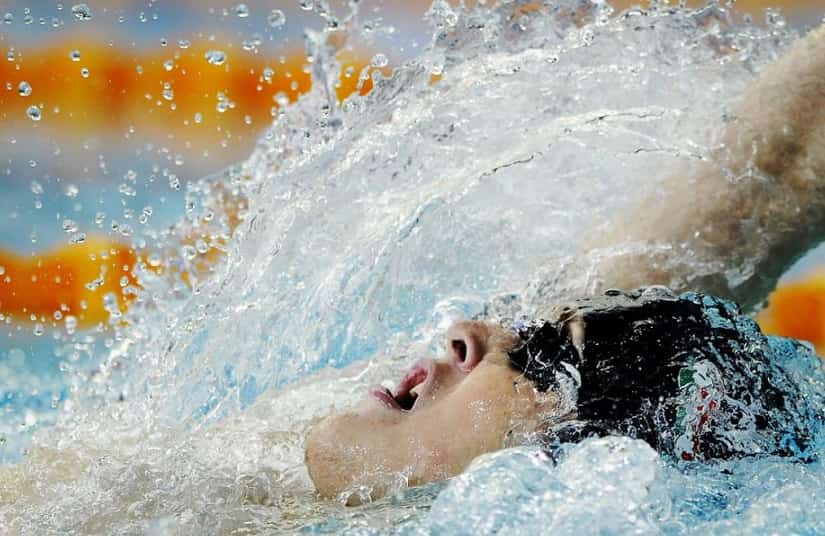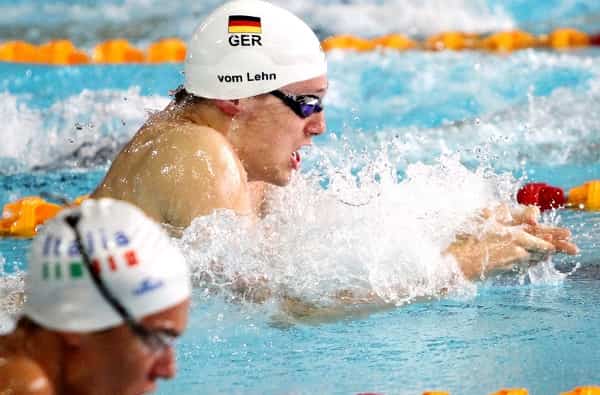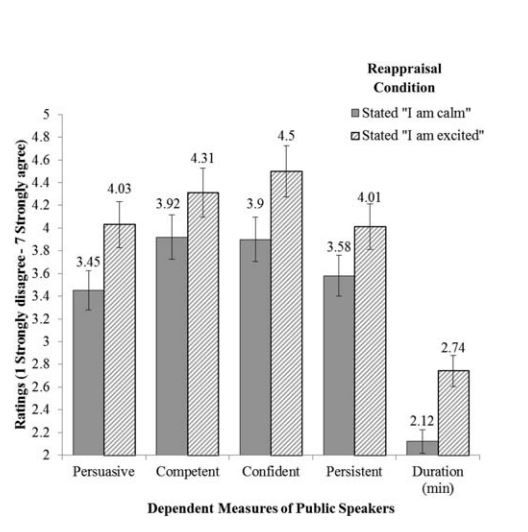Despite our best efforts, anxiety is an unavoidable part of competition. Here’s how you can avoid choking by judo-chopping your anxiety into excitement.
“How are you feeling?” my coach asked, heat sheet rolled up tightly in his fist, eyes fixed on the next heat of swimmers about to explode off the blocks.
“Good,” I said, shrugging one shoulder.
“Nervous?”
I nodded.
“It’s good, it means you are ready to swim fast!”
I wasn’t so sure.
After all, my stomach was churning. My left leg was pumping so madly I briefly wondered if I’d have any energy left for my race. And my eyes were darting up at the clock every ten seconds, a small worry that I might somehow miss my heat simmering in the back of my mind.
It was hard to imagine that I was going to swim fast at this point. After all, I felt like I was ready to spin off the planet.
 Supercharge Your Mindset (and Your Swimming)
Supercharge Your Mindset (and Your Swimming)
Mental training finally made simple. Get mentally tougher, choke-proof your races, seriously escalate self-confidence, and much more.
Used by some of the top swimmers and coaches on the planet, Conquer the Pool is the swimmer’s ultimate weapon for a better mindset and faster swimming.
Trying to Suppress Anxiety is a Lot of Work (and Usually Doesn’t)
We’ve been told that anxiety is bad. That stress is bad. So when we experience the natural and typical feelings and emotions that come with stress and anxiety before a big race, what’s our first instinct?
Alarm bells go off: Something is wrong.
We label how we are feeling as inherently not-awesome.
And we need to fix it.
Right.
Now.
And so we try to suppress those feelings, which just makes it worse. We sit there telling ourselves not to be anxious, which just pours fuel on the fire, making us more anxious. Our brains, those magnificent and paradoxical miracle machines have a way of doing the opposite thing we want them to do in times of high stress.
It’s like if I tell you not think of getting DQ’d, what are you going to start thinking about? Getting DQ’d. All the DQ’s.
This surplus of anxiety doesn’t help our cause in the pool, decreasing our brain’s working memory, crushing self-confidence and ultimately, our performance.
The aggravating reality is that trying to control or decrease cognitive anxiety is almost impossible: there are things we can do to calm the physical symptoms of anxiety (i.e. relaxation exercises to calm your heart rate), but because anxiety is an automatic reaction our attempts at completely putting out the fires are usually met with ineffective results.
(In fact, usually the more you try to suppress anxiety, the more anxiety you are going to end up experiencing according to this sobering study.)
Stress as Excitement: Is It That Simple?
Okay, so trying to subdue stress and anxiety doesn’t really work. Does that we mean we just sit there and suffer the performance-declining effects of it so that we don’t make it worse by trying to do something about it?
Well, no.
There is a better way.
And you probably already know what it is. After all, you’ve experienced it.
Think back to the last time you had a five-star race in the pool. How did you feel behind the block before the race? What was your emotional state like when you marched out onto the pool deck that night?
Anxious, but excited, I would bet.
Sure, you were feeling the nerves, but they weren’t out of control and there was a sense of confidence along with it. It wasn’t straight up anxiety: there was a fair amount of excitement in there as well. That’s the state where things really happen for you.
Simply reframing your anxiety as excitement switches things around almost immediately.
After all…
- Excitement makes sense to us, whereas anxiety is confusing as heck. When we know why we are feeling something, it’s okay. But when we experience a feeling that is murky and hard to control, it’s not. Excitement is an emotion that we understand and that we view positively.
- Going from stressed to excited is easier than trying to go from stressed to calmed. Anxiety and excitement are both “high-arousal” emotions; it’s a fine line between the two, making the transition from one to the other smoother. Compare this to trying to ratchet down level ten anxiety into a Zen-like calm: it takes a lot of work and usually in vain.
The Research on Anxiety Reappraisal
Some clear-headed researchers over at Harvard decided to see if there was a better way to manage stress and pre-performance anxiety, using three experiments designed to elicit a high amount of stress: singing, giving a public speech and math performance.
In the first part, participants were brought in and instructed to sing karaoke (“Don’t Stop Believin’” by Journey—no joke). Before stepping up to the microphone each person was assigned a statement to repeat and try their best to actually believe: “I am anxious” or “I am excited.”
As they belted out the tune, the Nintendo Wii used for the karaoke game measured the accuracy of the singer. Once done the participants self-reported measures of anxiety and excitement.
Singing accuracy was highest among the “I’m excite!” group. They also reported feeling more confident afterward.
Unsurprisingly, those who said, “I am anxious” tanked. You can guess how not awesome they reported feeling post-karaoke.
The second part of the study took 140 participants and gave each a couple minutes to throw together a speech on what makes them a good work partner. To ramp up the anxiety, the participants were told the speech would be recorded and the speech would be reviewed by a “committee of their peers.”
After they prepared a speech, but right before they started it, each was instructed to say either: “I am excited” or “I am calm.” Like the karaoke study, afterwards each participant filled out a quick self-report to test anxiety, excitement and confidence.
The “excite” group again kicked butt, outperforming the “calm” group when it came to persuasiveness, competence, confidence, persistence, and even duration of speech.
The third part revealed something else interesting.
When a group of students were told about the math test there were going to do, they were instructed to “get excited”, “stay calm” or “please wait a few minutes.”
Each participant had their heart rates being monitored, which revealed that no matter what they were instructed, there was no effect on heart rate. Why is this interesting? It shows that once we become nervous, no matter we frame it and no matter how well or not we perform an aroused physical state is tough to control.
Once again, the excite group out-performed the calm and neutral groups.
The Next Step
Okay, so we know that reappraising anxiety as excitement can have positive effects the next time we need to give a speech, do some math, or crush a song at a local karaoke bar. Cool beans.
But how do we apply this to our swimming?
How can we use this knowledge to get more from ourselves in the water and avoid the catastrophic effects of trying to wrap up our anxiety and smother it, simply making it angrier and more performance-debilitating?
By turning the high-arousal that comes with big pressure moments in the pool into opportunities instead of threats we can increase performance.
- View tough moments as challenges. Anxiety is at its worst when we see something as a threat. We worry about disappointing our teammates. We worry about “wasting” all our hard work. This stuff is threatening to us. Instead of viewing the tough moments in the water in this way, switch to an “opportunity” or “challenge” mindset.
- Focus on having fun. Yup, I know this can sound hollow when we are neck deep in anxiety. But as you’ve seen in the studies listed above, simply telling yourself something and then trying to believe it is all you need to get things moving in a positive direction. This is a golden opportunity to maximize your self-talk skills: “I’m excited to get to swim really fast!” or “I’m gonna have fun with this race.” Simple, but effective.
How we choose to interpret the things we are feeling makes all the difference: if you think about it, anxiety is a neutral experience, it’s how we experience and frame it that makes it good or bad.
The next time you are getting ready to race and feel like your anxiety is starting to get away from you take a mental step back, breathe, and tell yourself, “I’m excited to do some fast swimming.”
More Stuff Like This:
This New Mental Training Book Will Help You Swim Like a Rock Star This Season. Ready to take your swimming to the next level? Learn more about our awesome mental training book that will help you rock out with your socks out, whether it’s in practice or competition.
10 Things That Have Nothing to Do with Talent. Much is made about having lots of talent. But talent alone doesn’t make champion swimmers. And it’s something you also don’t control. Here’s what to focus on instead.
How Swimmers Can Develop World-Class Resilience. Grit, mental toughness, fortitude—whatever we’re calling it this week, is essential to your swimming success. Here’s why resilience is the difference maker you’ve been looking for in the pool.
















